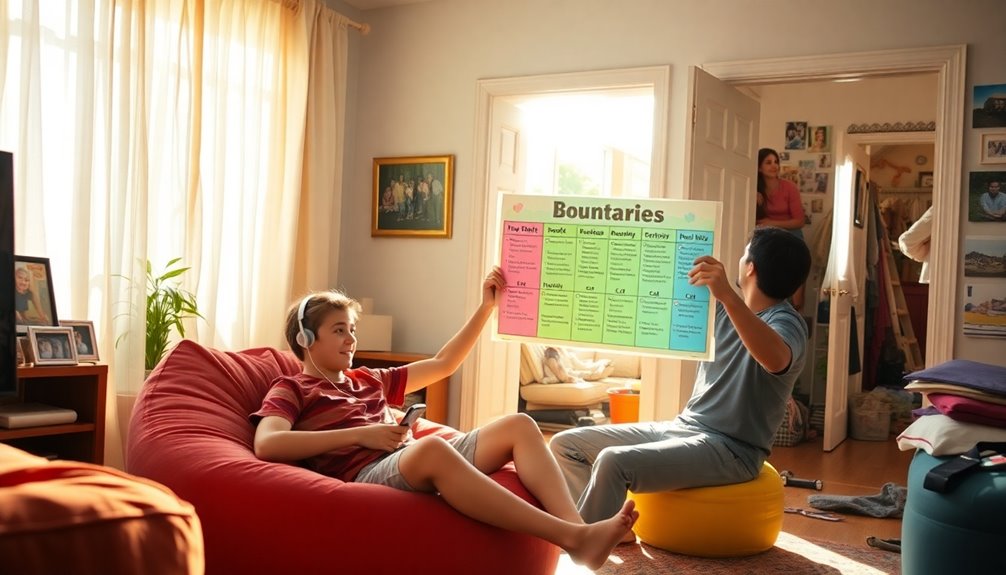When life gives you a teenager, embrace the chaos by understanding their developmental changes. Create a safe space for open communication and actively listen to their concerns. Setting flexible boundaries helps build trust while allowing them to make independent decisions. Share experiences through family activities, which strengthen your bond and create lasting memories. Navigate conflicts with empathy and focus on solutions, turning challenges into opportunities for growth. Celebrate their achievements, no matter how small, to boost their confidence. By adopting these strategies, you'll not only survive the teenage years but thrive together as a family. There's even more to explore!
Understanding Teenage Development
As you navigate the tumultuous years of adolescence, it's essential to understand that teenage development is a complex process. During this time, your child experiences significant cognitive development, shaping their ability to think critically, solve problems, and make decisions. They're processing information differently, often questioning authority and exploring new ideas. Reducing stress during this period can enhance their capacity for effective learning and emotional growth.
Simultaneously, emotional regulation becomes a key challenge. As they grapple with intense feelings, they may struggle to express themselves appropriately, leading to mood swings and misunderstandings. Recognizing these changes helps you support their journey. Encourage them to share their thoughts and feelings, fostering a safe environment where they can grow.
Additionally, incorporating healthy lifestyle choices like proper nutrition and exercise can greatly benefit their emotional resilience. Embracing this developmental phase can strengthen your bond and guide them toward becoming emotionally intelligent individuals. Furthermore, understanding that emotional strength is vital for navigating life's challenges can empower both you and your teenager during this transitional period.
Embracing Open Communication
How can you foster a deeper connection with your teenager? Embrace open communication.
Create a safe space where they feel comfortable sharing their thoughts and feelings. Encourage open dialogue by asking open-ended questions that invite them to express themselves more fully. Establishing a supportive environment can significantly aid in coping with mental health issues. Additionally, recognizing the importance of self-identity can help your teenager understand themselves better and communicate their feelings more effectively.
When they share, listen actively and show genuine interest in their experiences. It's crucial to provide honest feedback, too—be supportive yet truthful, helping them navigate challenges without judgment.
This two-way street strengthens trust and encourages them to come to you in tough times. Remember, the goal isn't just to communicate; it's to build a relationship that thrives on understanding and respect. Additionally, practicing self-compassion can help both you and your teenager navigate the complexities of emotions during this transformative time.
Setting Boundaries With Flexibility

While it's important to set boundaries for your teenager, flexibility is key to fostering a healthy relationship.
Establishing flexible guidelines creates an environment where your teen feels safe yet empowered. Instead of rigid rules, focus on clear expectations that allow room for negotiation. Emotional independence is crucial for their growth during these formative years. Recognizing and addressing the signs of unbalanced friendships can further help your teen navigate their social interactions effectively.
When your teen understands the reasoning behind these boundaries, they're more likely to respect them. For instance, if curfew is set at 10 PM, be open to adjustments when they demonstrate responsibility. This approach not only builds trust but also encourages them to communicate openly about their needs, as positive social interactions can help regulate mood and alleviate feelings of loneliness.
Encouraging Independence and Responsibility
Encouraging your teenager to embrace independence and responsibility is essential for their growth. Allow them to engage in independent decision making by giving them choices in daily tasks, like managing their homework or planning their weekends. This practice fosters confidence and helps them learn from both successes and mistakes. Additionally, setting SMART goals can provide a structured framework for their personal development.
Support their responsibility development by assigning age-appropriate chores or tasks that require commitment, like caring for a pet or managing their own budget. Additionally, establish a consistent daily task list to help them prioritize their responsibilities effectively. Regularly discussing the consequences of their decisions to reinforce accountability is crucial. By stepping back and giving them space, you'll empower your teenager to navigate challenges on their own, ultimately preparing them for adulthood.
Additionally, encourage them to practice self-sufficiency and responsibility, as this will promote personal growth and enhance their ability to handle future challenges. Embracing this phase not only strengthens their skills but also deepens your bond.
Sharing Experiences Together

Sharing experiences with your teenager can create lasting bonds and unforgettable moments.
Whether it's trying out a new hobby together or planning family activities, these shared interests help strengthen your relationship. Engaging in mindfulness techniques during these activities can enhance your connection and reduce stress. Active listening skills can also improve your communication during these shared experiences, making them even more meaningful.
Embrace the chaos and make time for these connections; they're essential for both of you. Friends provide unwavering support during life's challenges, helping navigate overwhelming situations.
Family Activities Bonding Moments
When you immerse yourself in family activities, you create opportunities for bonding that strengthen your connections with teenagers.
Think about organizing regular family game nights or planning weekend outings that everyone can enjoy. Engaging in creative projects together, like art classes or DIY crafts, can spark conversations and laughter.
Cooking nights allow you to share recipes and culinary skills while volunteering as a family teaches valuable lessons about compassion.
Don't forget about movie marathons or sports activities that can turn into cherished traditions. Nature hikes offer a chance to explore the great outdoors and unwind together.
Ultimately, music sessions can help you discover each other's tastes while creating lasting memories. Embrace these moments and watch your family grow closer.
Shared Hobbies and Interests
Finding common ground through shared hobbies and interests can transform your relationship with teenagers. Engage in mutual hobbies that spark joy, like art collaborations or music sessions.
Explore creative projects together, whether it's painting or crafting. Cooking experiences can become a delightful way to bond while passing down family traditions.
Consider sports activities that promote teamwork and healthy competition, enhancing both skill development and camaraderie.
Plan exploration adventures that encourage learning together, such as hiking or visiting museums. These joint activities not only foster connection but also create lasting memories.
Embrace the chaos of parenting by prioritizing shared interests, and watch your relationship flourish as you navigate this exciting phase of life together.
Navigating Conflict and Resolution
Steering through conflicts with teenagers can feel overwhelming, but using active listening techniques can help you understand their perspective.
By focusing on collaborative problem-solving strategies, you can turn disagreements into opportunities for growth.
Let's explore how these approaches can strengthen your relationship and foster a more peaceful environment.
Active Listening Techniques
While conflicts are a natural part of teenage life, employing active listening techniques can transform these challenging moments into opportunities for understanding. By truly hearing your teenager, you create a safe space for communication.
Here are some effective strategies:
- Maintain eye contact to show you're engaged.
- Use reflective feedback by paraphrasing their words, confirming you understand.
- Ask open-ended questions to encourage deeper dialogue.
- Avoid interrupting, allowing them to express their feelings fully.
- Validate their emotions, even if you don't agree with their perspective.
Implementing these active listening techniques can foster trust and connection, making it easier to navigate conflicts together.
Collaborative Problem-Solving Strategies
When conflicts arise, employing collaborative problem-solving strategies can turn disagreements into productive discussions.
Start by initiating collaborative brainstorming sessions where you and your teenager can openly share thoughts without judgment. Encourage them to express their feelings while you actively listen, fostering a safe space for dialogue.
Focus on solution-oriented discussions by identifying the root of the conflict together. Ask questions that promote critical thinking and allow them to explore potential solutions.
By working together, you not only resolve the issue at hand but also strengthen your relationship. Remember, it's about teamwork; your goal is to find a compromise that respects both your perspectives.
This approach nurtures independence and critical problem-solving skills in your teenager.
Practicing Empathy and Patience

Practicing empathy and patience is essential as you interact with teenagers, who often experience a whirlwind of emotions and thoughts.
By developing your emotional intelligence and honing your perspective taking skills, you'll establish stronger connections with them.
Here are some practical ways to cultivate empathy and patience:
- Listen actively without interrupting.
- Validate their feelings, even if you don't agree.
- Share your own experiences to foster understanding.
- Ask open-ended questions to encourage dialogue.
- Take a deep breath before responding to emotional outbursts.
These steps not only help you understand their perspective but also create a safe space for them to express themselves.
Celebrating Milestones and Achievements
Celebrating milestones and achievements is essential in a teenager's life, as it boosts their confidence and reinforces their sense of self-worth. Whether it's a good grade, a sports win, or completing a challenging project, make it a point to acknowledge these moments.
You can create milestone celebrations that are meaningful to them, whether it's a small family gathering or a fun outing with friends. Achievement recognition doesn't have to be elaborate; even a simple congratulatory note or a heartfelt conversation can make a big impact.
Building Trust and Connection

Building trust and connection with your teenager is essential, as it lays the foundation for open communication and mutual respect.
Engaging in trust building activities and connection exercises can strengthen your bond. Here are some effective strategies:
- Schedule regular one-on-one time to chat without distractions.
- Share interests by participating in a hobby together.
- Practice active listening; show empathy and understanding.
- Create a safe space for your teen to express feelings without judgment.
- Encourage honest conversations about their thoughts and experiences.
Conclusion
Steering through the teenage years can feel like riding a rollercoaster, but remember, you're in this together. By fostering open communication and setting flexible boundaries, you'll not only support your teen's growth but also strengthen your bond. Embrace the chaos and share experiences, celebrating each milestone along the way. With empathy and patience, you'll build trust and connection, turning challenges into opportunities for growth. So, buckle up and enjoy the ride—it'll be worth it!


